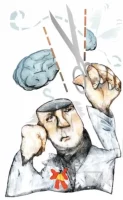Una figura muy utilizada en situaciones de emergencia como las que está viviendo España es la de “estamos al borde del abismo”, pero las cosas discurren a tal velocidad que ya hemos pasado ese umbral y en realidad nos encontramos en el desbarrancadero, palabra popularizada por el escritor colombiano Fernando Vallejo, que tituló así una de sus mejores novelas. O sea, rodando a toda velocidad barranco abajo hacia una sima que aún ni vemos ni sabemos cómo es. Algunos la imaginan como la España de los años cincuenta. Otros, más optimistas, creen que no será tanto, que si acaso volveremos a la pobreza grisácea de finales de los sesenta…
Pero cuando se lee en solo unos días que España pide 100.000 millones de Euros a la Troika, pero que no quiere que se le llame rescate; que la desconfianza bancaria eleva a niveles récord la fuga de capitales, que la Unión Europea a través de la comisión ejecutiva critica con dureza prácticamente todas las medidas de Rajoy contra la crisis desde la reforma laboral, la amnistía fiscal (por escasamente recaudadora), el aumento del IRPF hasta la fusión de las reguladoras o los pagos a proveedores y dos páginas más adelante, o más atrás, se habla del nuevo récord de la prima de riesgo y el enésimo hundimiento de la bolsa, ambos parámetros a niveles nunca conocidos, la gente se pregunta: ¿cómo es que un gobierno causante y génesis de los citados titulares, no cae, no dimite, no se va?… Seguir leyendo »

